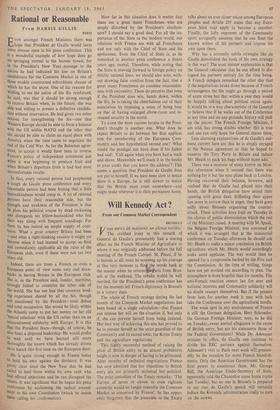Rational or Reasonable
From DARSIE GILLIE
PARIS
LIVEN amongst French Ministers there was hope that President de Gaulle would leave some avenue open in his press conference. This is a wonderful example of how hope does go on springing eternal in the human breast, for in the President's New Year message to the nation he had indicated his line on Britain's candidature for the Common Market in one of those weakly constructed subordinate clauses of which he has the secret. One of his reasons for wishing to see the union of the Six reinforced, he said, was that it should be strong enough to receive Britain when, in the future, she was able and willing to present a definitive candida- ture without reservation. He had given two other reasons for strengthening the Six—one that Western Europe should be able to form a balance With the US within NATO and the other that she should be able to claim an equal place with America when the time came to negotiate the end of the Cold War. As for the Bahamas agree- ment, to accept it would have been to reverse France's policy of independent armament just When it was beginning to produce fruit and when Britain's departure from it had had most uncomfortable results.
In fact, every rational person had prophesied Et tough de Gaulle press conference and every reasonable person had been hoping that a little hurnankindness would creep in. A lot of rational Persons have their reasonable side, but the strength and weakness of the President is that he plots his political course by dead reckoning and disregards his fellow-humankind who feel their way along with frequent soundings. For them he has indeed an ample supply of cour- tesies. What a great. country Britain had been ---and what a right-thinking country it might yet become when it had learned to accept as final and immediately applicable all the rules of the European club, even if these were not yet two Years old.
Indeed, there are from a French or even a European point of view some very real draw- backs in having Britain in the European club. She is as the President said, insular, maritime, strongly linked to countries the other side of the world. She has not had that common bind- ing experience shared by all the Six, though not mentioned by the President—total defeat and total occupation. She would be likely within the Atlantic camp to put her money on her old special relations' with the US rather than on an Unaccustomed solidarity with Europe. It is this that the President fears—though, of course, he also fears a disputed leadership. He would prefer to wait until we have learned still more thoroughly the lesson which has already driven Us to knock this first time on the European door.
He is quite strong enough in France today to hold his own against the doubters. It was pretty clear since the New Year that he had Called to heel those within his own rank who had offered objections and he can disregard the others. It was significant that he began his press Conference by acclaiming the radical amend- ment to his own Constitution (which he insists upon calling his confirmation). How far in this situation does it matter that there are a great many Frenchmen who are deeply disturbed by the President's absolute- ness? I should say a good deal. For all the im- portance of the State in the modern world, our relations with France are with all Frenchmen and not only with the Chief of State and his spokesmen. Even the Chief of State is, as he remarked in another press conference a dozen years ago, mortal. Therefore, while noting that the State is moving forward in foreign policy on strictly rational lines, we should also note, with- out drawing false comfort from the fact, that a great many Frenchmen do combine reasonable- ness with rationality. These do perceive that even if the President does win, hands down, within the Six, he is taking the cheerfulness out of their association by imposing a sense of being boss on that of having enlarged elbow-room and in- creased security in the world.
To some the most curious lacuna in the Presi- dent's thought is another one. What does he expect Britain to do between her first applica- tion for membership of the European Com- munity and her hypothetical second one? What would the prodigal son have done if his father had said : 'Call again when you have had a wash and shave. Meanwhile we'll mark it in the books to your credit that you know the address'? This seems a question that President de Gaulle does not put to himself. If we hav-e been slow to notice there is a Europe, he is still slower to notice that the British must roost somewhere—and might make wherever it is their permanent home.






























 Previous page
Previous page